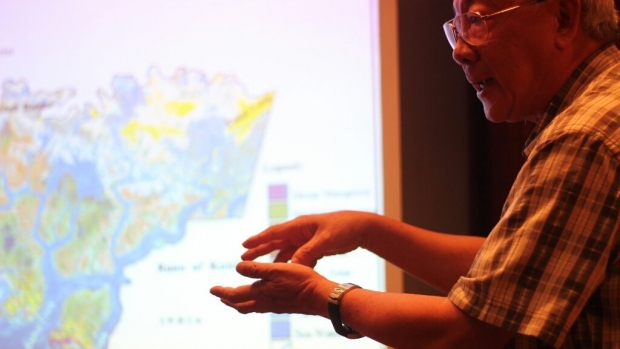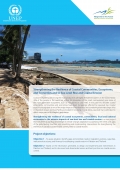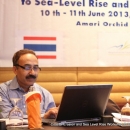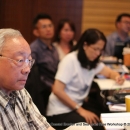Grants :: Regional Grant Facilities :: Strengthening the Resilience of Coastal Communities, Ecosystems, and Economies to Sea-Level Rise and Coastal Erosion
Strengthening the Resilience of Coastal Communities, Ecosystems, and Economies to Sea-Level Rise and Coastal Erosion

Dr Wong Poh Poh, International Consultant to Coastal Erosion ... , Pattaya, Thailand © IUCN Thailand, 2013
Objectives
Objective 1 - Identify and understand existing coastal ecosystems’ vulnerabilities to coastal erosion and sea-level rise in Pakistan and Thailand through situation analysis and assessment of coastal erosion policies, legal and institutional mechanisms including interventions to address coastal erosion.
Objective 2 - Identify and design specific “pilot interventions” that could be considered for future replication and/or scaling up in other MFF countries, based on the national assessment.
Objective 3 - Implement pilot project (intervention) in each country under the financial and time limitations of the project, distilling lessons learned and good practices in implementing interventions to sea-level rise-induced coastal erosion.
Background
Coastal ecosystems are among the most productive, yet highly threatened systems in the world. Nearly 40% of the people in the world live within 100 kilometers of the coast, concentrated near some of the most vulnerable ecosystems, such as mangroves or coral reefs. In the past two decades coastal ecosystems, communities and economies have been increasingly affected by sea-level rise. Coastal erosion is recognized as one of the major impacts of sea-level rise, and considering that many large cities in the Indian Ocean and Asia Pacific are located in low-lying coastal deltas, sea-level rise is estimated to affect major parts of the region’s population.
"Strengthening the resilience of coastal ecosystems, communities, local and national economies to the adverse impacts of sea-level rise and coastal erosion" helped to develop practical knowledge in climate change adaptation by assessing the needs and gaps of the participating countries, and prioritizing and implementing interventions for strengthening the resilience of coastal ecosystems and communities to coastal erosion.
The project was implemented in two MFF countries, namely Pakistan and Thailand. The project was implemented in three phases:
- Phase 1 - Assessment and understanding of national and sub-national settings (situation analysis);
- Phase 2 - Identification, prioritization and design of selected interventions;
- Phase 3 - Implementation of selected pilot interventions.
In each of these phases, a number of activities were implemented in the two MFF participating countries.
The first activity implemented was the Inception Meeting:
In Pattaya, Thailand, an Inception Workshop launched the project. This project built on UNEP COBSEA's USD 400,000 grant from the Government of the Republic of Korea ("Yeosu Project: Addessing the Challenge of Sea-Level Rise and Coastal Erosion in the East Asian Seas - Initial Implementation of the COBSEA Regional Strategy"), which has also been implemented in Cambodia, Indonesia, Malaysia, Philippines, and Vietnam since 2012.
The inception meeting was organized in collaboration with Thailand's Department of Marine and Coastal Resources. The meeting discussed coastal erosion and the impacts of sea level rise in Thailand and was attended by professional global geography and coastal management experts. University of Singapore lecturer Dr Wong Poh Poh gave a presentation about a study made about coastal erosion in Thailand. The country's coast, more than three thousand kilometers in length, is reported to have severe erosion (between 8 percent to more than 26 percent). Participants from Pakistan were interested in Thailand's traditional wisdom on using bamboo to trap sediment and assist in mangrove rehabilitation.
Target beneficiaries
Coastal zone managers and senior level decision makers in sectoral departments with responsibilities for the coast of Thailand and Pakistan.
Outputs
The project’s expected results were as follows:
1. Enhanced understanding of coastal vulnerability related to coastal erosion due to sea-level rise and an assessment of the current set of policies, legal systems and institutional arrangements relevant to addressing coastal erosion in Pakistan and Thailand.
2. Reports and recommendations are shared with all the relevant national stakeholders (including the local authorities) as well as regional experts and sectoral managers.
3. Enhanced national coordination and an open dialogue between all stakeholders, including local affected communities.
4. National, sub-national and local authorities are more prepared to face the negative impacts of sea-level rise and coastal erosion by having developed or strengthened policy and/or specific strategies to address coastal erosion;
5. Implementation of the specifically identified and prioritized pilot interventions to address coastal erosion.
Accomplishments and challenges
Accomplishments:
- An assessment of the gaps and needs in legislation, policies, capacities, institutional structures, and finances for addressing coastal erosion in Pakistan and Thailand have been identified and prioritized.This has been successfully achieved as described in the National Assessment Reports which is a detailed assessment of erosion situation in Pakistan and Thailand. The interventions were prioritized and agreed during the national consultation workshops for implementation in the second phase of the project.
- Based on the information generated, pilot interventions have been identified complete with a work plan and budget in the assessment report as agreed during the national consultations. Both countries have developed coastal erosion management plans as main intervention supported with national consultations and workshops.
- In Pakistan the coastal erosion issue was discussed during a meeting of the Senate Standing Committee. The Standing Committee requested the Ministry of Climate Change for the provision of a copy of National Assessment Report on Coastal Erosion and has directed relevant authorities to follow the recommendations of the National Assessment Report. The report reveals that if the current trend persists, sea level rise in Pakistan will occur by 5 cm in the next 50 years, having grave implications for coastal areas such as Thatta, Badin and Karachi.
Challenges:
- A major concern relevant to project management and implementation was the delays due to administrative procedures and requirements especially during the initial phase of the project. This limited the time available to implement the national activities and the pilot interventions which is a key component and outcome of this project.
Lessons Learned
- The regional inception workshop was necessary to identify and discuss project implementation issues and concerns including giving guidance to national authorities, clarifying matters and reaching agreement on the activities and expected outputs, ensuring smooth implementation of the project and its activities. It also provided an opportunity for national authorities to meet and discuss their initial assessment on the coastal erosion situation and management in their respective countries, allowing them to share information and exchange experiences on the matter.
- The national consultation and engagement process among national and local authorities has been proven necessary to discuss and agree on the findings and recommendations of the assessment reports including the recommended pilot interventions for implementation. It also provided an opportunity for the representatives of different ministries, various levels of government and other sectors to meet, discuss and learn about coastal erosion related matters, encouraging cross-learning and team building, thereby enhancing cooperation, coordination and dialogue among the different representatives.
- There is a need to raise public awareness on coastal erosion at both national and regional level. The development and publications of the National Assessment Reports will help to raise and promote public awareness on coastal erosion and sea-level rise in the region.
- The regional concluding workshop was essential in project implementation as it provided project partners an opportunity to present and share their accomplishments prior to project completion. It provided an avenue for knowledge and information sharing among project partners, donors and other regional organizations, including exploring follow up projects at regional and national levels.
- To ensure smooth implementation of project activities and to ensure timely delivery of activities and outputs at the national level, it was necessary for the project and for the countries to identify, nominate and engage National Partner Institutions and National Consultants who would be responsible for coordinating and implementing national activities.
- The role of NCBs was proven necessary; especially in facilitating, coordinating and communicating with national partner institutions the implementation and administrative requirements of the project.
Country
Location
Pakistan and Thailand
Topic
Duration
1st Jan 2013 to 31st Dec 2014
MFF Grant Amount
USD199,994
Co-financing Partner
- Government of the Republic of Korea under the Yeosu 2012 Project (wider COBSEA region): USD 200,000 (financial contribution)
- UNEP-COBSEA: USD 40,000 (in kind contribution)
Total co-financing: USD 240,000
Implementing Partner
The project is implemented by UNEP COBSEA (Coordinating Body on the Seas of East Asia) in collaboration with key National Partners:
- Ministry of Climate Change, Pakistan
- Department of Marine and Coastal Resources, Ministry of Natural Resources andEnvironment, Thailand
Related Events
Coastal Erosion and Sea Level Rise Inception Meeting
Amari Orchid Pattaya, Thailand 10 Jun - 11 Jun 2013
Inception Meeting of the UNEP Project
“Strengthening the Resilience of Coastal Communities, Ecosystems, and Economies and to Sea-Level Rise and Coastal Erosion”
10-11 June 2013, Pattaya, Thailand
Related Images
Related Publications

Strengthening the resilience of coastal communities, ecosystems, and economies to Sea Level Rise and Coastal Erosion
Author: UNEP
Publisher: UNEP
Posted on: 14th Nov 2013
Category:
Size: 2 MB


